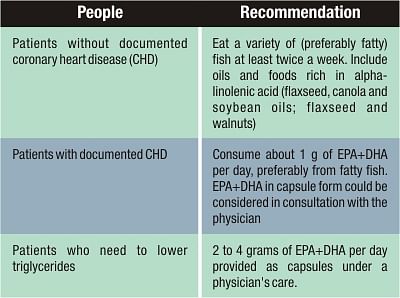Be a fishy person

Most of us should eat more fish. It is an excellent source of protein containing essential vitamins and minerals, such as selenium and iodine. In addition to other benefits, fish oil contains omega 3 fatty acids without which leading a healthy life may never have been easy.
Fatty fish are high in two kinds of omega-3 fatty acids, eicosapentaenoic acid (EPA) and docosahexaenoic acid (DHA).These are essential fatty acids that our body needs in order to function properly.
These acids benefit the heart of healthy people, and those at high risk of cardiovascular disease. By reducing triglyceride levels and helping to reduce blood pressure, this oil is very beneficial. Fish oil may also thin the blood, resulting in a reduced risk of blood clots and stroke.
Fish oil also offers physical and mental benefits. Fish oil seems to have serotonin re-uptake properties. Serotonin is the chemical in the brain that helps to control our moods. By aiding in the re-uptake in serotonin, some researchers believe that fish oil can help fight depression and other mental conditions.
There are non-oily fish (white fish) and Oily fish (fatty fish).White fish such as Telapia, Rohu, Ayer, Pomfret, Cat fish and Cod (not available in our country) are very low in fat. Oily fish like Pangash, Katla ,Trout, Carp and Hilsa are rich in omega 3 fatty acids and a good source of vitamins A and D. White fish contain some omega 3, but at much lower levels than oily fish. Although fresh tuna is an oily fish and is high in omega 3 fatty acids, but these fatty acids are reduced to levels similar to white fish when it is canned. So, although canned tuna is a healthy choice for most people, it does not count as oily fish in fact.
American Heart Association (AHA) recommends eating fish (particularly fatty fish) at least two times a week. Since a large amount of the world's fish is contaminated with mercury and other dangerous toxins, some people are very much worried about eating fish. They believe that the only alternate way of getting enough fish oil is to get it in a supplement that has been refined the toxins in the fish. Although, fish is rich in omega-3 fatty acids that are essential for brain and nervous system, development in unborn babies — but in 2001 and again in 2004, the Food and Drug Administration (FDA) in the USA issued consumer advisories recommending that pregnant and nursing women restrict their consumption of seafood to no more than 12 ounces of seafood per week due to concerns about mercury contamination.
AHA also recommends eating tofu and other forms of soybeans, canola, walnut and flaxseed, and their oils. These contain alpha-linolenic acid (LNA), which can become omega-3 fatty acid in the body. The extent of this modification is modest and controversial; more studies are needed to show a cause-and-effect relationship between alpha-linolenic acid and heart disease.
The table below is an AHA guide to use for consuming omega-3 fatty acids.
Patients taking more than 3 grams of omega-3 fatty acids from capsules should do so only under a qualified doctor's care. High intakes could cause excessive bleeding in some people.

 For all latest news, follow The Daily Star's Google News channel.
For all latest news, follow The Daily Star's Google News channel. 



Comments